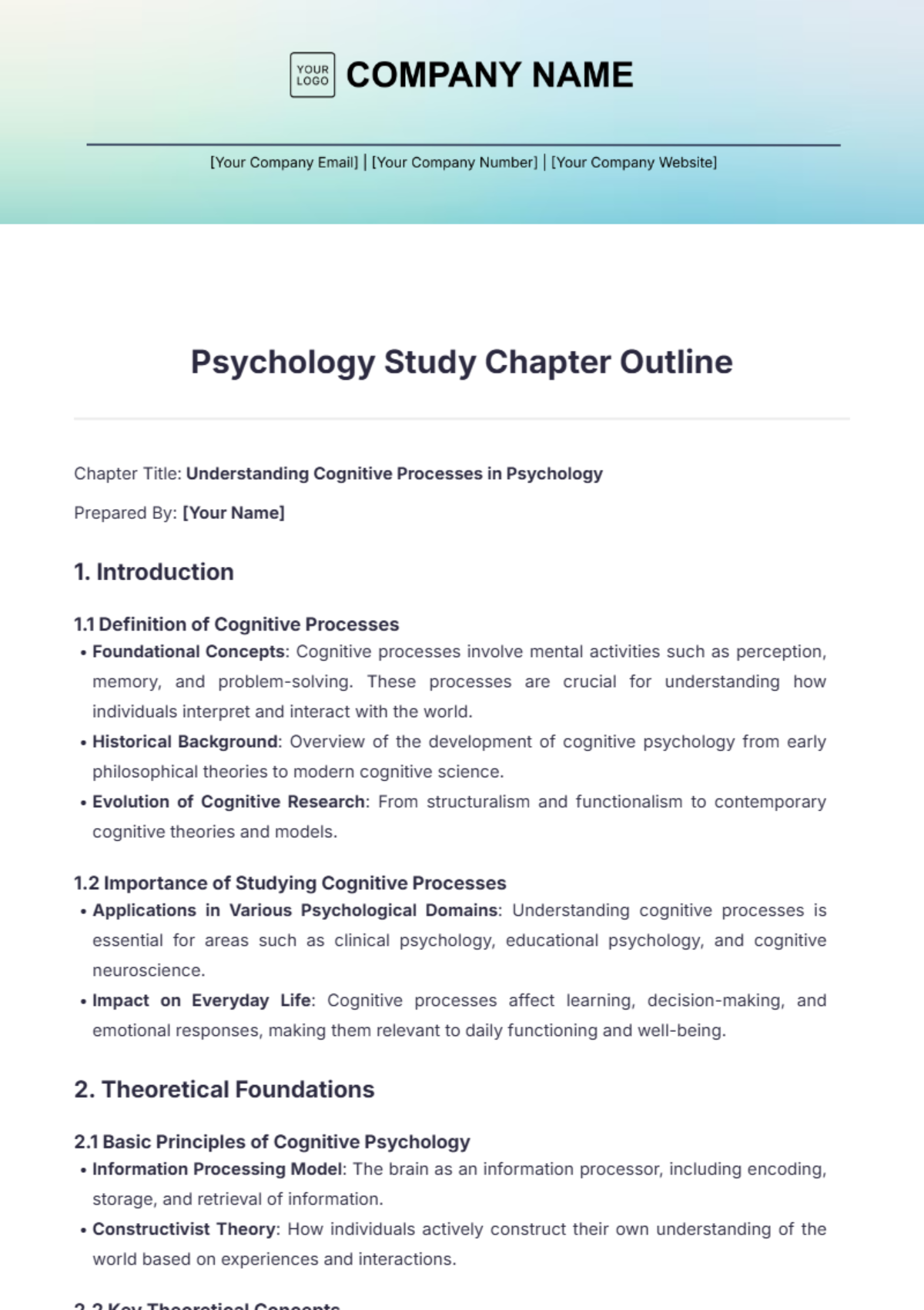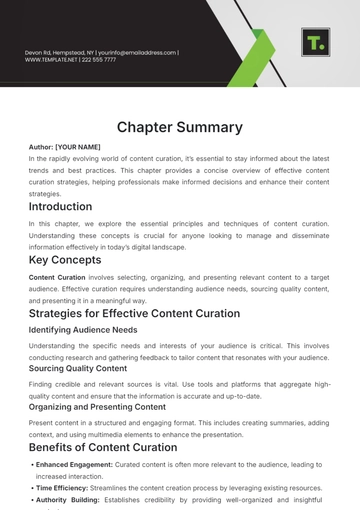Free Psychology Study Chapter Outline

Chapter Title: Understanding Cognitive Processes in Psychology
Prepared By: [Your Name]
1. Introduction
1.1 Definition of Cognitive Processes
Foundational Concepts: Cognitive processes involve mental activities such as perception, memory, and problem-solving. These processes are crucial for understanding how individuals interpret and interact with the world.
Historical Background: Overview of the development of cognitive psychology from early philosophical theories to modern cognitive science.
Evolution of Cognitive Research: From structuralism and functionalism to contemporary cognitive theories and models.
1.2 Importance of Studying Cognitive Processes
Applications in Various Psychological Domains: Understanding cognitive processes is essential for areas such as clinical psychology, educational psychology, and cognitive neuroscience.
Impact on Everyday Life: Cognitive processes affect learning, decision-making, and emotional responses, making them relevant to daily functioning and well-being.
2. Theoretical Foundations
2.1 Basic Principles of Cognitive Psychology
Information Processing Model: The brain as an information processor, including encoding, storage, and retrieval of information.
Constructivist Theory: How individuals actively construct their own understanding of the world based on experiences and interactions.
2.2 Key Theoretical Concepts
Attention: Mechanisms of selective attention and its impact on cognitive performance.
Memory: Types of memory (e.g., short-term, long-term) and models of memory processes.
Perception: How sensory information is interpreted and understood.
Problem-Solving and Decision-Making: Strategies and cognitive biases affecting problem-solving and decision-making processes.
3. Research Methods
3.1 Experimental Methods
Controlled Experiments: Techniques for manipulating and measuring cognitive variables in a controlled environment.
Neuroimaging Studies: Use of brain imaging techniques (e.g., fMRI, EEG) to investigate cognitive processes.
3.2 Observational Methods
Case Studies: In-depth examination of individual or group cognitive processes.
Naturalistic Observation: Observing cognitive processes in real-world settings.
3.3 Surveys and Questionnaires
Self-Report Measures: Tools for assessing cognitive processes through participant self-reports.
Standardized Tests: Use of validated instruments to measure cognitive abilities and functions.
4. Applications of Cognitive Psychology
4.1 Cognitive Processes in Learning
Educational Techniques: Application of cognitive principles to enhance teaching and learning methods.
Memory Improvement Strategies: Techniques for improving memory retention and recall.
4.2 Cognitive Processes in Clinical Settings
Cognitive Behavioral Therapy (CBT): Application of cognitive principles to treat psychological disorders.
Cognitive Rehabilitation: Interventions aimed at restoring cognitive functions in individuals with brain injuries or neurological conditions.
4.3 Cognitive Processes in Technology
Human-Computer Interaction: Design principles based on cognitive processes to improve user experience.
Cognitive Load Theory: Application of cognitive load principles to optimize information presentation and task performance.
5. Current Trends and Future Directions
5.1 Emerging Areas in Cognitive Psychology
Cognitive Neuroscience: Advances in understanding the neural basis of cognitive processes.
Artificial Intelligence and Cognitive Modeling: Use of AI to simulate and study cognitive processes.
5.2 Innovative Research Approaches
Longitudinal Studies: Investigating changes in cognitive processes over time.
Cross-Disciplinary Research: Integration of cognitive psychology with fields such as genetics and social sciences.
5.3 Implications for Future Research
Identified Research Gaps: Areas requiring further exploration and study.
Potential Research Questions: New questions arising from recent findings and theoretical developments.
6. Conclusion
6.1 Summary of Key Points
Recap of the main concepts discussed in the chapter, including the significance of cognitive processes and their applications.
6.2 Contributions to the Field
Reflection on how the chapter enhances understanding of cognitive psychology and its impact on various domains.
6.3 Future Outlook
Emphasis on the importance of ongoing research and exploration in cognitive psychology.
- 100% Customizable, free editor
- Access 1 Million+ Templates, photo’s & graphics
- Download or share as a template
- Click and replace photos, graphics, text, backgrounds
- Resize, crop, AI write & more
- Access advanced editor
Streamline your research with Template.net's Psychology Study Chapter Outline Template. This editable and customizable tool is designed to help you organize your psychology study efficiently. Tailor each chapter to your specific needs, ensuring a clear and comprehensive structure. Perfect for students and professionals, this template simplifies the planning process, making your research more effective and impactful.





























